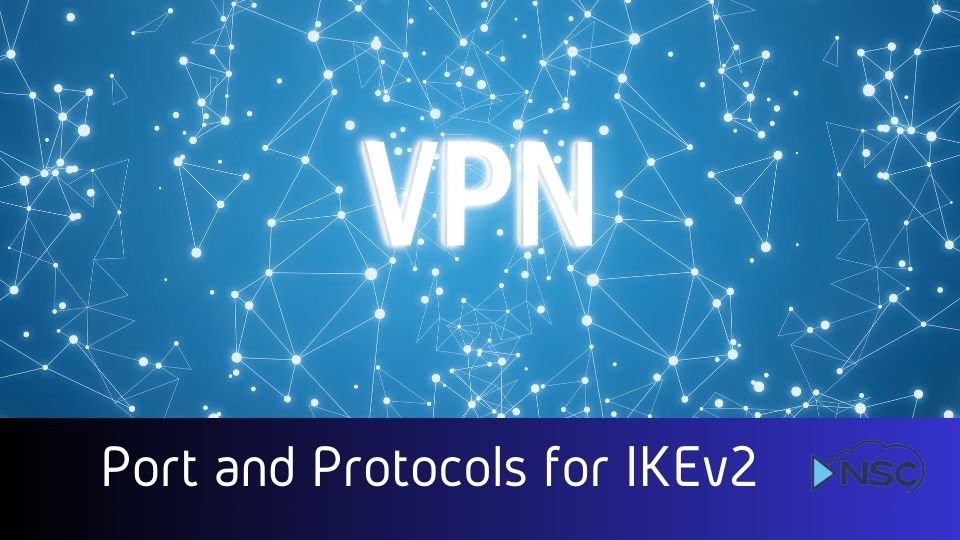When setting up a secure network connection, choosing the right protocol and understanding the ports it uses are critical. Internet Key Exchange version 2 (IKEv2) is a popular protocol that, combined with IPsec, creates a robust framework for securing VPN connections.
This blogpost dives deep into the ports utilized by IKEv2, why they matter, and how you can configure your systems to leverage this protocol for enhanced security and performance.
Whether you're an IT professional looking to secure your company's data or a remote worker in need of a reliable VPN connection, this guide will provide you with the essential knowledge on IKEv2.
From its key features and setup process to addressing common challenges, you'll learn everything you need to ensure secure and efficient communication. Plus, we'll explore when and why IKEv2 should be your go-to option for VPN connections.
Understanding IKEv2
Internet Key Exchange version 2 (IKEv2) is a protocol that plays a crucial role in the setup of VPN connections, making it a cornerstone of modern cybersecurity practices. It works hand-in-hand with IPsec (Internet Protocol Security) to provide a secure and stable connection over the internet. At its core, IKEv2 facilitates the negotiation of security policies and the exchange of key material between two parties, ensuring that data remains encrypted and inaccessible to unauthorized users.
One of the standout features of IKEv2 is its ability to automatically re-establish a VPN connection if it's ever dropped. This is especially useful for mobile users who move between network connections, such as switching from mobile data to Wi-Fi. Additionally, IKEv2 supports Mobility and Multihoming Protocol (MOBIKE), enhancing its reliability and making it a preferred choice for users on the go.
Why Choose IKEv2?
- Stability and Reliability: IKEv2 is known for its stable connection, even when switching networks. This makes it ideal for mobile devices that frequently move between different types of networks.
- Security: Working alongside IPsec, IKEv2 offers strong encryption and authentication methods. This ensures that the data passing through the VPN is secured against eavesdropping.
- Efficiency: IKEv2 is efficient in its use of bandwidth and resources, which can improve the performance of VPN connections, especially in environments where network speed and bandwidth are concerns.
Setting Up IKEv2
Setting up IKEv2 is straightforward. Most operating systems, including Windows, macOS, and iOS, have built-in support for IKEv2, simplifying the process of establishing a secure VPN connection. For platforms that don't natively support IKEv2, such as some Linux distributions and Android devices, third-party software can be used to implement the protocol.
- Choose a VPN Service: Select a VPN service that supports IKEv2. This is crucial for ensuring compatibility and security.
- Install Any Necessary Software: If your device or operating system requires third-party software to use IKEv2, install it according to the provider's instructions.
- Configure the VPN Connection: Use the VPN service's configuration details to set up the VPN connection on your device. This typically involves specifying the server address, connection type (IKEv2), and your login credentials.
For those looking to deepen their knowledge on VPNs and network security, visiting our IPsec course will provide you with a comprehensive understanding, from basic principles to advanced configuration strategies.
By implementing IKEv2, individuals and organizations can secure their online communications, ensuring that sensitive data is protected from potential threats. It's a protocol designed for the modern internet user, balancing robust security measures with the flexibility required by today's mobile and dynamic network environments.

Ports Utilized by IKEv2
When it comes to establishing a secure VPN connection, knowing the specific ports and protocols involved is key. For IKEv2, two main User Datagram Protocol (UDP) ports are pivotal: 500 and 4500. These ports are not just numbers; they are gateways for secure data exchange, ensuring that your VPN connection is both reliable and secure.
Port 500
- Initial Key Exchange: This is the port where the magic starts. It's used for the initial exchange of keys between your device and the VPN server, setting the stage for a secure connection.
- Authentication: Beyond just key exchange, port 500 plays a critical role in the authentication process, verifying the identities of the connecting parties to prevent unauthorized access.
Port 4500
- NAT Traversal: In many cases, networks use NAT (Network Address Translation) to map multiple private IP addresses to a public one. Port 4500 ensures that IKEv2 traffic can pass through NAT devices without interruption, making it crucial for maintaining a stable VPN connection across various network environments.
Why These Ports Matter
Understanding and configuring these ports correctly is crucial for the efficacy and security of your VPN connection. Incorrect settings can lead to connection issues, such as VPN tunnels not establishing correctly or dropping frequently.
Ensuring Secure Communication with IKEv2
The choice of IKEv2, coupled with the correct configuration of its essential ports, provides a secure and efficient framework for VPN connections. It offers strong encryption standards and the ability to navigate through complex network architectures, such as those involving NAT.
- Security: By using these ports, IKEv2 ensures that all data transferred between your device and the VPN server is encrypted, making it virtually impossible for unauthorized parties to eavesdrop on your communications.
- Flexibility: The ability of IKEv2 to work seamlessly across different network types and conditions, including those involving NAT, makes it a versatile choice for various use cases, from individual remote work setups to complex organizational networks.
For individuals and organizations alike, ensuring the correct setup of IKEv2 ports is a step towards achieving a secure, reliable, and flexible network environment. By prioritizing the security of your VPN connections, you safeguard your data against potential cyber threats, ensuring that your online activities remain private and protected.
Common Challenges and Solutions with IKEv2
While IKEv2 is renowned for its security and stability, like any technology, it's not without its challenges. However, understanding these issues and knowing how to address them can ensure your VPN connections are as robust as possible.
Challenge 1: Firewall Blocking
- The Issue: Firewalls are designed to block unauthorized access to a network. However, they can sometimes also block legitimate VPN traffic, particularly if the firewall is not configured to allow traffic through the ports IKEv2 uses (UDP 500 and 4500).
- The Solution: To circumvent this, ensure your firewall is configured to allow traffic through these ports. It's a simple adjustment that can prevent unnecessary disruptions to your VPN connection.
Challenge 2: Device Compatibility
- The Issue: Not all devices natively support IKEv2. This can pose a challenge in environments with a diverse range of hardware and operating systems.
- The Solution: For devices that do not support IKEv2 out of the box, consider third-party VPN clients that are compatible with IKEv2. StrongSwan is a popular open-source VPN client that supports IKEv2 and can be used on many platforms, including Linux and Android.
Who Should Use IKEv2?
IKEv2 is an excellent choice for various users and scenarios, but it shines particularly in certain contexts due to its strengths.
- Mobile Users: Given its support for MOBIKE, IKEv2 is particularly well-suited for mobile users who frequently switch between different networks (e.g., from mobile data to Wi-Fi). Its ability to maintain a VPN connection during these switches makes it ideal for smartphones, tablets, and laptops.
- Remote Workers: For individuals working remotely, stability and security are paramount. IKEv2 offers a reliable and secure connection that can handle the dynamic nature of remote work environments, ensuring that sensitive work data remains protected.
- Organizations with Diverse Networks: Businesses that operate across various network environments will benefit from IKEv2's flexibility and compatibility with NAT traversal, making it a strong choice for corporate VPNs.
Summary
IKEv2 is a powerful protocol that stands out for its security, reliability, and efficiency. Understanding the ports it uses and how to address common challenges can greatly enhance your VPN experience, whether you're a mobile user, remote worker, or part of an organization with complex network needs.
By implementing the solutions to common challenges and configuring your devices correctly, you can leverage IKEv2 to create a secure, stable, and flexible VPN connection. This not only protects your data but also ensures a seamless online experience, regardless of where you are or what device you're using.


